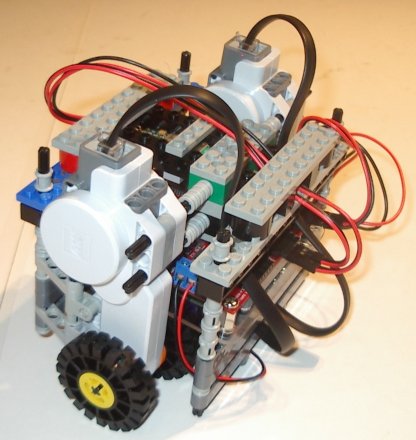Difference between revisions of "Nidarbot"
m (→Pictures) |
m (→Performance) |
||
| Line 26: | Line 26: | ||
The robot runs nicely and reliably. The movements are sometimes not completely even, and this | The robot runs nicely and reliably. The movements are sometimes not completely even, and this | ||
| − | is due to the | + | is ether due to the wheels - the tires might need to be glued to avoid slipping on the wheel center, |
| − | or they need to be replaced for another type. Another important issue is to protect its cables | + | or they need to be replaced for another type, or, more likely just due to uneven geometry of the bottom. |
| − | and connectors. Even though they are placed on the back, the robot is vulnerable to attacks from | + | Our goal was to build a robot that moves, not yet a perfect one! Another important issue is to protect |
| + | its cables and connectors. Even though they are placed on the back, the robot is vulnerable to attacks from | ||
the rear side. Pictures and/or videos coming later. Now we need to add sensors and more interesting | the rear side. Pictures and/or videos coming later. Now we need to add sensors and more interesting | ||
functionality to this robot! | functionality to this robot! | ||
Revision as of 00:37, 9 December 2006
Description
The first robot we built with Cerebot and LEGO pieces has two NXT motors connected directly to two wheels. The motors are driven through one HB2 PMOD. There is also a BlueTooth module connected to a serial port. The robot is powered from one 9V battery located at its bottom.
Functionality
After reset, the robot prints the following menu on the terminal (serial port):
Nidarbot controller 1) forward 2) backward 3) spin left 4) spin right 5) set power (20) 6) exit
Then it expects your choice entered through the PC keyboard and further transmitted over BlueTooth to its serial port. The first four options will make the robot move in the given direction until any key is pressed. The fifth option allows to enter the power applied to the motors 0-20, and the last option exits.
Performance
The robot runs nicely and reliably. The movements are sometimes not completely even, and this is ether due to the wheels - the tires might need to be glued to avoid slipping on the wheel center, or they need to be replaced for another type, or, more likely just due to uneven geometry of the bottom. Our goal was to build a robot that moves, not yet a perfect one! Another important issue is to protect its cables and connectors. Even though they are placed on the back, the robot is vulnerable to attacks from the rear side. Pictures and/or videos coming later. Now we need to add sensors and more interesting functionality to this robot!
Software
Robot was programmed in C using WinAVR and Procyon AVRlib. The whole project can be downloaded here.
Pictures
Click here to see more pictures and a video.
